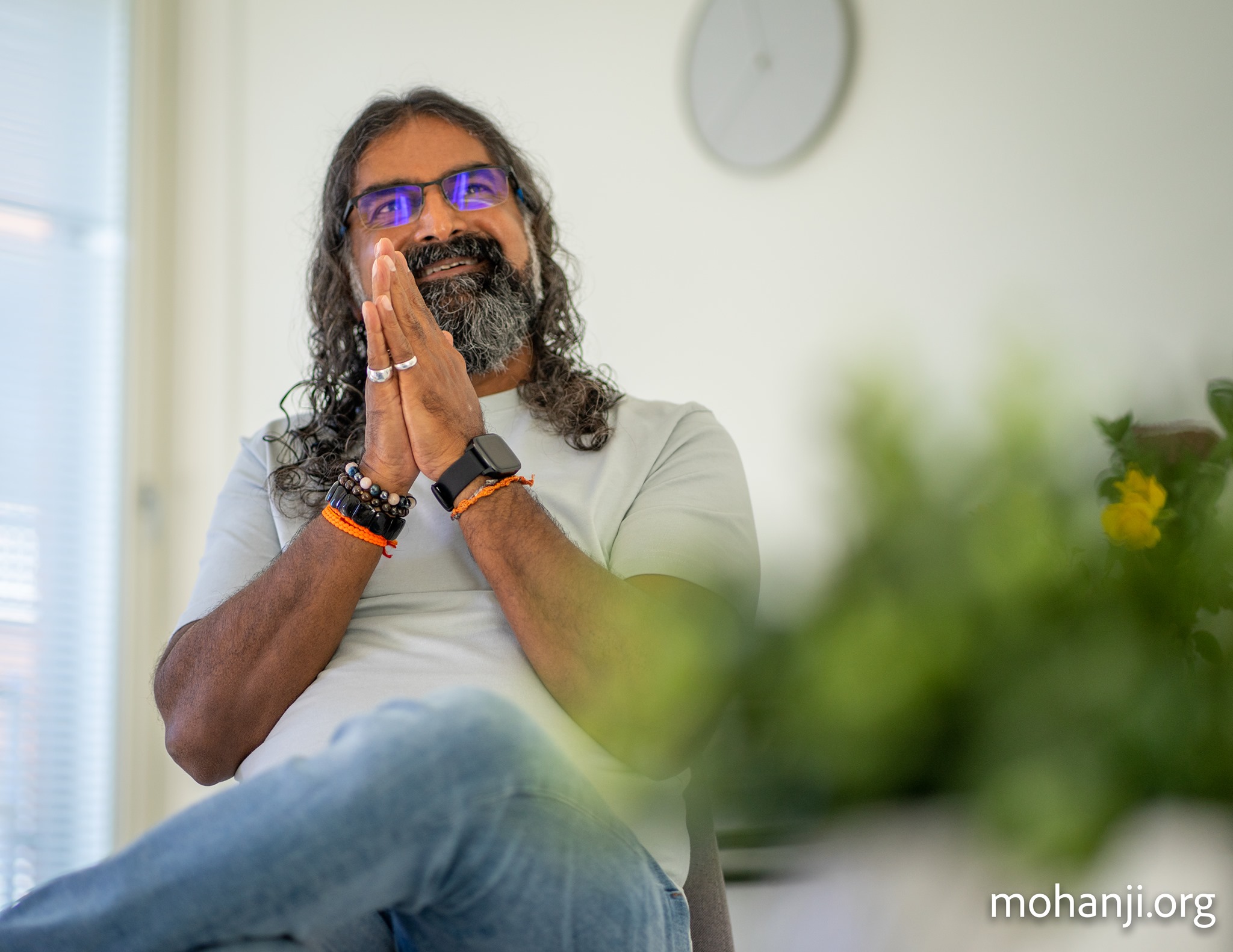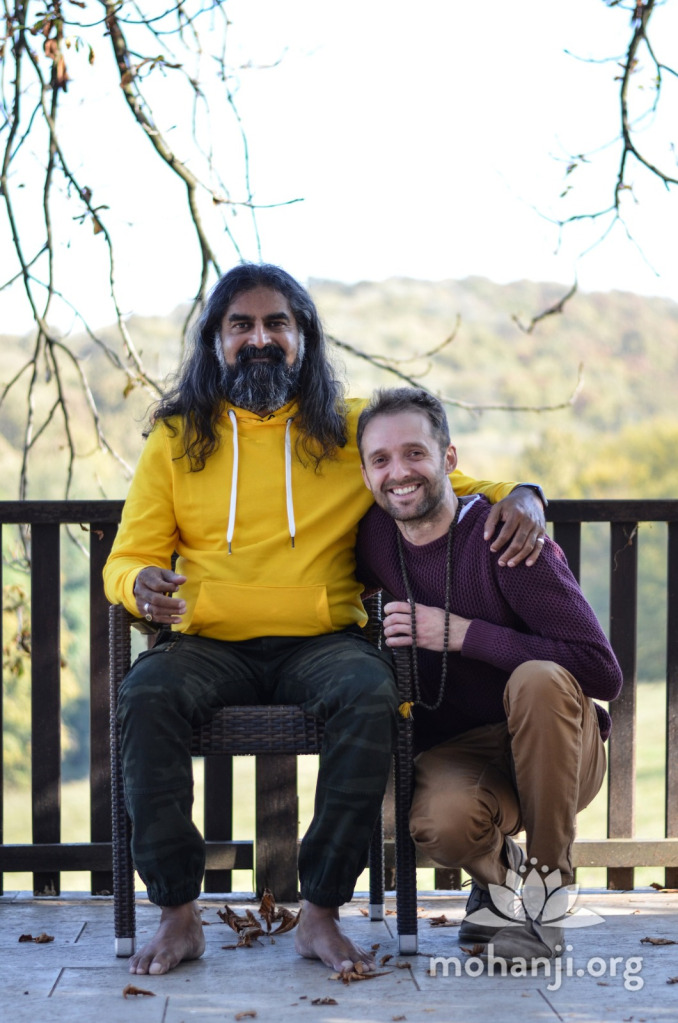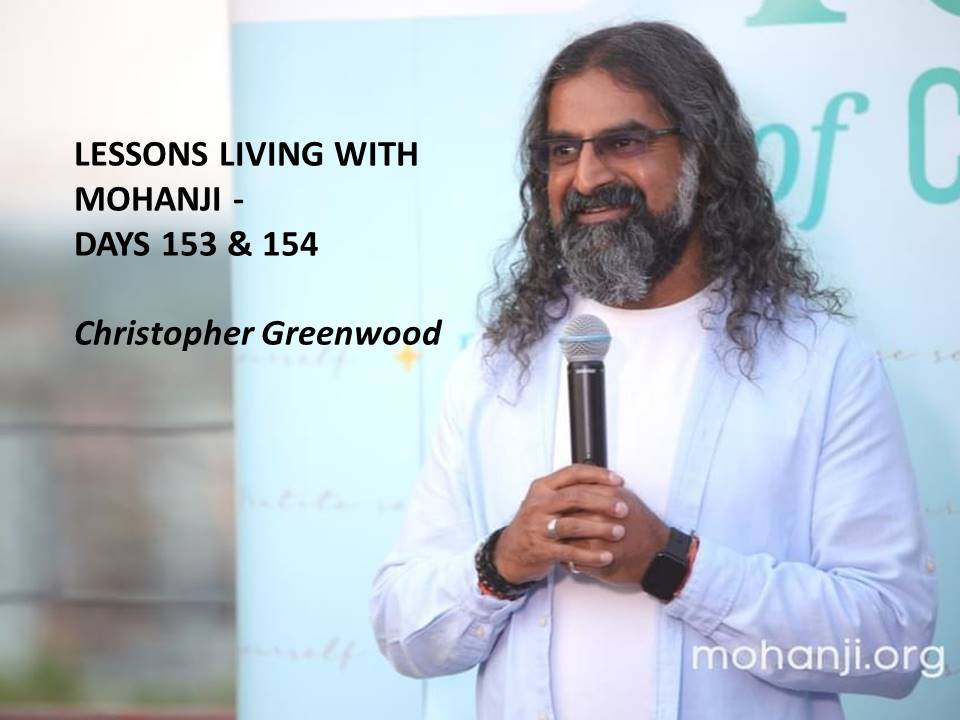Day 153 – Making sure activities are with purpose
As we’re here in Slovenia, we’re looking at everything that we can do to move the activities on the land and on the ground forward. I visited the land for the first time, and we were conducting the fruit tree plantation. It was really fun to go there to see the land, the whole area, and what space we have.
We have the forest, the stream at the bottom, the place where we’ll have a pond looking out across all of the surrounding nature, all beautiful. It’s been snowing here, and it’s been pretty cold, so we wanted to go back and check on the trees, make sure that they are okay and also walk the boundaries again so that we can make sure that we’ve got our space clear and we can begin the work.
Today I share a lesson which has come from discussions with Mohanji about these activities. That is: making sure that there’s always purposefulness to an activity, that we’re always looking to reach the end goal or the outcome in everything we do related to a specific activity, so that we’re very clear about what we want to get and nothing is vague, nothing is confused, or nothing’s lost. That brings efficiency, and that time is used well.
It’s exciting for me to think that soon, there’ll be a space where all of us can come. For example, the land here is large, with clean air. There’ll be the forest, which will have all the rishis and the munies like sages Agastya and Lopamudra. There’ll be the lake with all the beings of the water, turtles and fish. There will probably be some decking down there at the bottom because it catches the sun in the afternoon. Maybe there’s some space for outdoor yoga or meditation. It could maybe even be a little refreshment place down there at the bottom of the land.
Then, across the stream, when you look across the flatland, which could even have accommodations, small chalets or yurts, or something like this. The main Center will be at the top of the land, where all the meditations, yoga and canteen will be. Because it’s a unique shape, with sloping land, all the banks could be landscaped really well and uniquely with caves there as well; a place of real peace.
As it’s Covid times, it is a little more challenging to do everything we’d like to do, but we are still moving something along. Today in the morning, I spoke about the plan for the next few days. That’s when Mohanji reminded me that, now especially, we always need to be purposeful with everything that we’re doing because we haven’t got the luxury of time. We don’t know what tomorrow will bring. If we’re doing something, let’s make sure we’re doing it with purpose, so it cannot be loose, and we cannot take time for granted because we don’t know what’s coming. He really stressed this.
I thought that this was a good lesson to share today for bringing efficiency and effectiveness to our activities. There were three things which he spoke about for this. The first was responsibility. That’s somebody who takes on a job, is entrusted with the task, and says they’re going to do it. Finding that person and ensuring that they understand what they need to do and what they will achieve.
The second is accountability. When someone’s taking on the job, they must also take on the accountability to see it right through to the end, to ensure that it is completed. The third was always a definitive timeline. This is the difference between people saying, “Yes, sure, I can do this,” and saying, “Yeah, sure, I can do this, and I’ll finish it by this date.” That’s very important because even if the date is some time out in the future, if they’ve given it, then at least it can be supervised at that point in time.
That accountability within the activities and tasks is really important. Because if someone has taken on a job, but then it has not been completed or finished, or perhaps not coming with a timeline means that things become loose. The activity doesn’t happen as it should have or planned, which can create inefficiencies because you have to go back and you have to check whether things are being done well.
In summary, making sure there is responsibility – someone is taking the role. Accountability – seeing it through to the end. Lastly, putting on a timeline of when something will be done by.
I’ve spoken about these things in previous messages, but now in the context of moving forward with our activities here at the land in Slovenia, I thought it’s good to share how we’re approaching it and most especially since we’re working with limited time.
Have a great day ahead.

Day 154 – Overthinking suffocates action
Yesterday we visited the land in Slovenia, which, as I’ve mentioned before, is really stunning. It was a beautiful, sunny day, very crisp, a little bit cold, but a perfect day to walk around the boundaries and check, to look at the trees we planted, which all are still flourishing, which is fantastic. I look forward to the day when we can all come together there, when we can meet there, and people will be staying, the structures will be in place, and it will be a real place of peace, ‘Shanti’.
I was thinking about Mohanji’s approach to activities, not only how he’s very effective in creating an initiative, an idea, but then also in executing them or putting them into action. This is one area in which I’ve really learned a lot. Sometimes previously, I could become very stuck in the paralysis of over-analysis, over-thinking about an idea or an approach before actually taking a step to do something. To implement something, I’d like to have the full information, all the small details, everything in place, and everything considered before taking steps. Making sure that everything was looked at. But what happened then is that I felt burdened because I’d have all of these ideas but no tangible output for them. I wouldn’t feel good. That would be a hit to self-esteem, which would take some time to rebuild.
I was always thinking I could do that, but then there was no implementation of something, and as Mohanji said before, which was really useful for me, is that a person who has a very, very, very small bit of knowledge, but can execute it well, is more effective for the world, because they’re doing more for the world than someone who has the all world’s knowledge in their head, but then can’t do anything about it and just regurgitate. This was an interesting outlook for me and so learning from Mohanji, I’ve pushed myself, or not pushed, but encouraged myself to change this approach and follow his lead.
The key here lesson for me is that when you think too much about something, action won’t happen. I think that this is an optimum time for thinking, for considering everything now, to assess the whole picture, to make sure that you’ve got good enough of an understanding and then quickly move into action. Otherwise, the thinking was a trap which I used to fall into.
I felt like something was happening, but in reality, it wasn’t. It was just a mental activity. When I observe Mohanji, he’s very quick into action. He thinks, and then, “Okay, let’s do this”. Then the action happens. It’s where the dynamics come from for the office. He doesn’t sit and think and think and think about things. He just does enough. Thinking about me, one mistake I can make is thinking and then going into the micro details about everything and in the end, nothing happens.
What’s more effective, because when an action happens, it benefits people, is to think, get the picture, give it due consideration and then, when needed, make changes and put it into action, but quickly. This also brings a good feeling of accomplishment, and then we can move on to the next task.
Hope you have a great day ahead.

|| JAI BRAHMARISHI MOHANJI ||
Edited & Published by – Testimonials Team, 21st August 2022
Disclaimer:
The views, opinions, and positions expressed by the authors and those providing comments on these blogs are theirs alone and do not necessarily reflect the views, opinions or positions of Mohanji, Mohanji Foundation, it’s members, employees or any other individual or entity associated with Mohanji or Mohanji Foundation. We make no representations as to accuracy, completeness, timeliness, suitability or validity of any information presented by individual authors and/or commenters on our blogs and will not be liable for any errors, omissions, or delays in this information or any losses, injuries or damages arising from its display or use.
We reserve the right to delete, edit, or alter in any manner we see fit blog entries or comments that we, in our sole discretion, deem to be obscene, offensive, defamatory, threatening, in violation of trademark, copyright or other laws, of an express commercial nature, or otherwise unacceptable.
Mohanji Testimonials team


